Helping to explore and fulfil analytical biochemistry needs
The Biological Mass Spectrometry (BioMS) Facility is dedicated to the identification, characterisation and quantification of proteins , metabolites and other biological molecules using mass spectrometry and associated technologies.
BioMS has recently linked with the Stoller Clinical Analysis Research Facility and the Centre for Advanced Pharmacokinetic Research (CAPKR) to support high quality and robust discovery-based and clinical investigations.
Our central technology remains mass spectrometry, but we provide access to a range of technologies and methodologies for higher throughput and automated sample preparation, industry grade ligand binding assays, and comprehensive data analysis. All of this is supported by our staff with decades of experience in applying these resources to your research.
Our services are available to both The University of Manchester’s researchers and external users.
How we work
Meeting your analytical biochemistry needs
We are here to help you explore and fulfil your analytical biochemistry needs in a fully supported, rapid and easy to access manner.
The facility provides comprehensive support for your analysis needs, including:
Consultancy
Full consultancy support on experimental design and correct technical approaches.
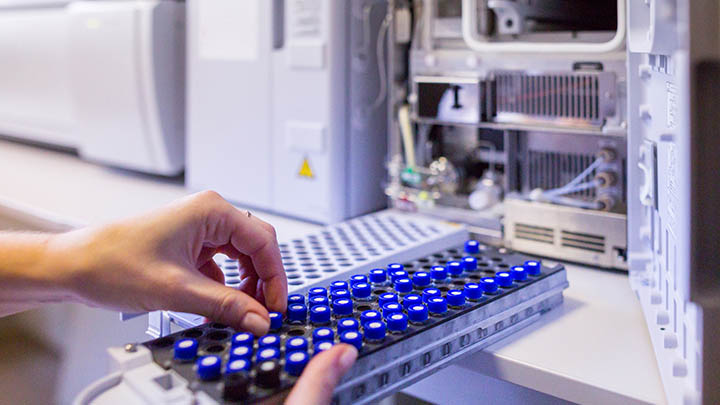
Providing access to equipment
Access to automated and manual sample preparation technologies supported by comprehensive tracked protocols and the option for us to perform selected methodologies for you.
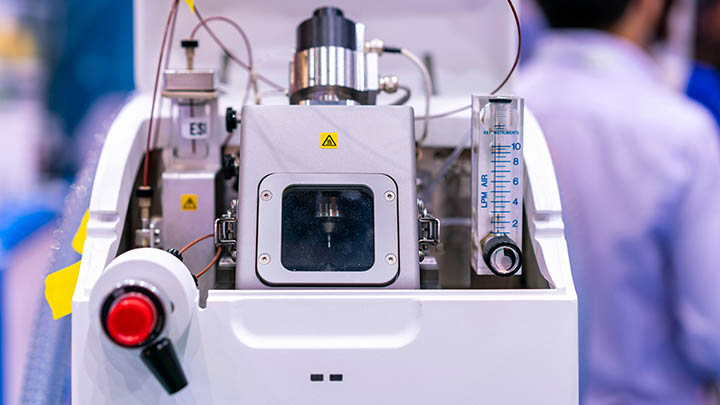
Data acquisition and management
Expert data acquisition in the latest equipment with a guaranteed high level of performance, comprehensive research data management and support in assessment and interpretation.
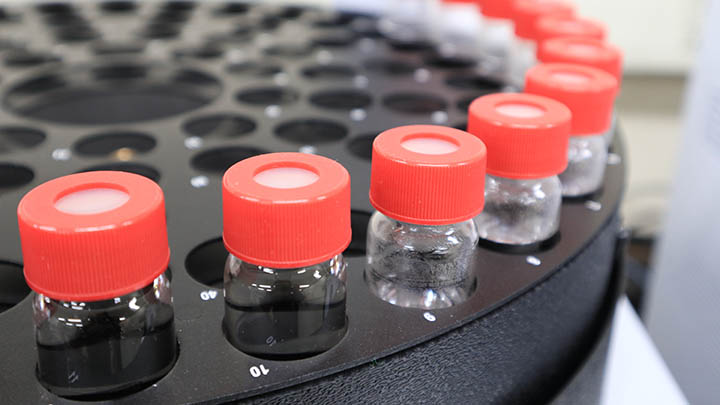
Data analysis
Access to a range of the best available data analysis packages on remote access high performance computing hardware, with expert support from our in-house bioinformaticians.
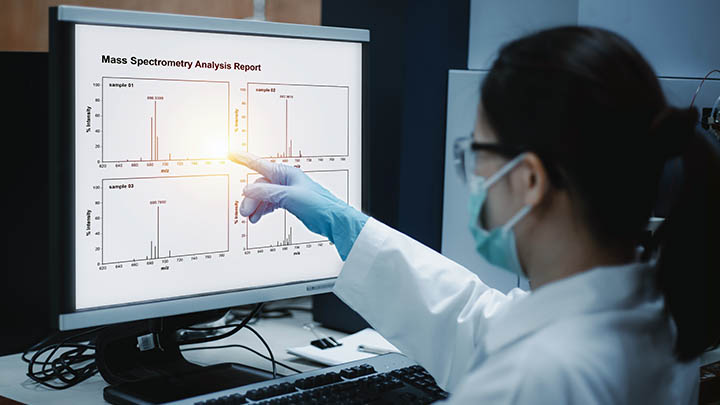
Applications
Answering your biological research questions
Our expertise and technologies can be used to address a broad spectrum of questions in biological research. We are continually expanding the range of analysis that we provide, so please contact us if you do not see the particular application that you are interested in.
Proteomics is the unbiased analysis of the composition of a complex mixture of proteins whether that is from a cell line, tissue, liquid biopsy, media or a subset of any one of them.
We have extensive experience of the analysis of all these sample types and are particularly experienced in the characterisation of the extra-cellular matrix through our links with the Wellcome Trust Centre for Cell-Matrix Research.
Proteomics can be applied to tiny amounts of material to provide valuable information about micro-environments using techniques such as laser capture dissection in collaboration with the Bioimaging facility and flow cytometry in collaboration with the Flow cytometry facility.
Post-translational modifications such as phosphorylation are central to the understanding of how cells transmit signals and respond to their environment. We can help investigate changes in protein phosphorylation.
The investigation of protein function can be aided by the investigation of the protein partners that the protein works with. These experiments focus on isolating possible interactors by either co-isolation or proximity tagging methodologies. We have many years of experience in supporting these experiments and can provide you with highly comprehensive support and provide you with introductions to other researchers who are well established in this field.
For those interested in specific proteins, including the production of recombinant proteins, we offer a range of service support options. These include in-gel digestions for confirmation of identification, intact mass determination for precise molecular validation and multi-enzyme digests for looking for post-translational modifications.
Some protein markers of disease, such as cytokines and other inflammation related proteins, are present at very low levels and are difficult to detect by mass spectrometry. The BioMS Facility therefore offers complementary industrial quality ELISA analysis including easy to access multiplexed assays for the most popular markers that are available on a per well basis.
Cells communicate and interact with each other via chemical signals that can be useful for many purposes such as controlling cell differentiation or having antimicrobial properties. We can help you isolate and identify these compounds in association with the separation technologies in the Biomolecular analysis facility.
Many studies require the high quality quantification of a drug, its metabolites, or other biological small molecules such as metabolites. We can develop targeted methods to provide you with the quantification support you require from rapid relative quantification assays through to fully validated absolute quantification assays.
Metabolomics provide a relatively unbiased analysis of the composition of a complex mixture of metabolites. One of the major challenges for metabolomics is the identification of unknown compounds so the BioMS facility offers two complementary approaches. Metabolomics support provides a comprehensive fingerprint of the small molecules within a sample for those interested in looking for subtle shifts in a cell phenotype. Small molecules screening provides high confidence comparison of the common metabolites in our chemical library for those who prefer quality over quantity.
Technologies and equipment
Enabling your research
We have a wide range of mass spectrometry and associated equipment to help you further your research.
- Thermo Exploris 480 with FAIMS Pro with U3000 nanoUPLC
- Thermo Lumos Fusion with U3000 nanoUPLC
- Thermo QE HF with U3000 nanoUPLC
- Sciex 7600 ZenoTOF with Waters M Class microUPLC
- Sciex 7600 ZenoTOF with Shimadzu LC30 UPLC
- Sciex 6500 QTraps (x2) with Exion AD UPLCs
- Agilent Intuvo GCMS
- Covaris LE220+ focused ultrasonicator
- Covaris cryoPREP freeze fracture system
- PBI Barocycler
- MPBio FastPrep 96
- Biotage ExtraHera LV robotics system
- Thermo Kingfisher Flex magnetic bead robot
- Beckman Biomek NXP robot
- Full support for the S-Trap pipeline
- Equipment for tube and plate based methods in centrifuges, shakers and incubators
- SunCollect sprayer
- SunDigest in-situ digestion incubator
- MassTech AP MALDI UHR source
- ImaBiotech Multimaging workstation
- MSD QuickPlex SQ 120 system
- Luminex 200 system
- SpectraMax i3x system
- Protocols.io
- Open Science Framework (OSF)
- QPulse
- Local and virtual high performance workstations
- Centralised data storage and distribution with cloud archiving
- Thermo Proteome Discoverer
- Matrix Science Mascot
- Proteome Software Scaffold
- Sciex ProteinPilot
- Biognosys Spectranaut
- DIA-NN
- Waters QI
- ImaBiotech Multimaging
- SkyLine
External access
Working with industry and other academic institutions
Although primarily focused on supporting researchers at The University of Manchester, we have many years' experience of working with other academic institutions and industry partners.
Academic institutions
We are happy to work with users from any academic institution, and provide these users with the same sample turnaround and level of advice as we would for our internal users.
Email us: bioms@manchester.ac.uk

Industry
We have worked with a number of companies ranging from start-ups to multinationals, both on an individual basis and as part of packages of work involving multiple facilities.
Work is mostly done in a contract research manner, where we provide advice and direction to answer a question. Service support, where we perform the analyses requested, is also available.
Please contact our Business Development Manager for further details if you are interested in accessing the facility.
Dr Joanne Flannelly
Email: joanne.flannelly@manchester.ac.uk
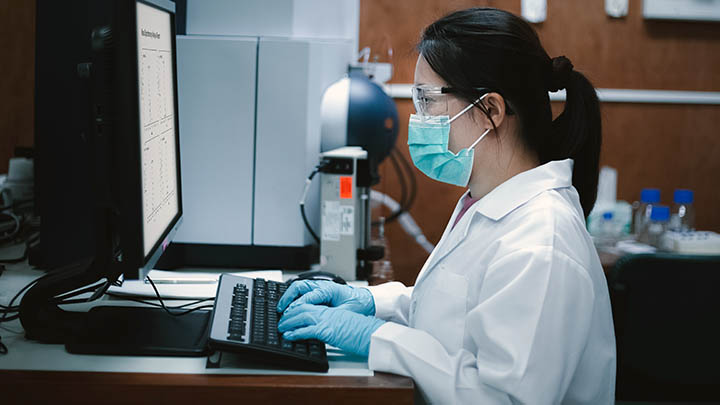
Publications and outputs
Contributing to high impact outputs
Our services have underpinned high impact publications across a wide range of disciplines.
Journal of Cell Biology, 2020.
The facility worked with the authors to provide an exemplar or large scale protein interactions analysis.
Clinical Proteomics, 2020.
The facility worked with the authors to establish and optimize a laser capture dissection workflow that is now used by many other groups.
The EMBO Journal, 2021.
The facility worked closely with the authors to provide the high sensitivity and specificity data required for phosphoproteomics.
Aging Cell, 2021.
The facility worked with the authors to address challenging biological problems such as characterising highly modified aged extra-cellular matrix.
- DOI: 10.1111/acel.13355
Clinical Pharmacology and Therapeutics, 2021.
The facility worked with the authors to translate proteomics into a quantitative tool for producing in silico models of metabolism as an exemplar of the facility’s translational applications.
- DOI: 10.1002/cpt.2396
Journal of Archaeological Science, 2021.
The facility can work with a wide range of sample types. In this example, the facility helped the authors to characterise biological traces on ancient ceramics.
ACS Nano, 2021.
The facility worked with the authors to demonstrate the potential of a new technique for clinical analysis.
Contact us
Find out more
Get in touch for further information or to inquire about using our facility.
For general enquiries about accessing the facility, please email bioms@manchester.ac.uk
For more detailed enquiries about the facility and how we work, please contact:
Dr David Knight (Principal Experimental Officer and Facility Manager)
Email: david.knight@manchester.ac.uk
Address:
Biological Mass Spectrometry (BioMS) Core Facility
Faculty of Biology, Medicine and Health
B.2071 Michael Smith Building
The University of Manchester
M13 9PT
Maps and travel
We are based in the Michael Smith Building (Building 71 on the University campus map (PDF).
Technology platforms
Technology platforms
We have a pioneering environment and facilities for research, innovation and technology development.
Technology platforms main page
